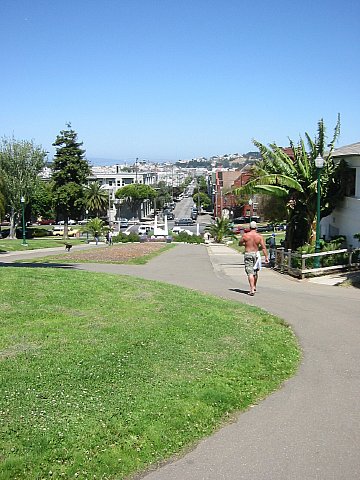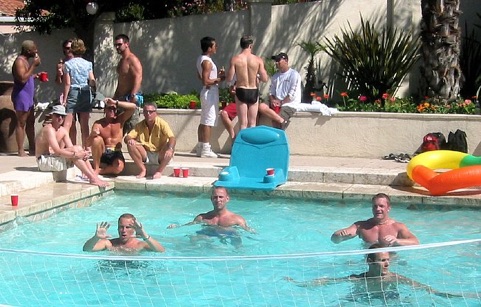One Year in the US
26 July 2002
Yesterday marked the first anniversary of my arrival in the United States, so it's probably time for another letter about what we've been up to and what I've thought about living here.
Since my last e-mail we haven't had any major excursions, though events were on here in the form of Fourth of July, San Francisco Pride and Dore Alley Fair and later this week we're going for a beach holiday near New York on Fire Island for a week.

It's Summer here, which has been an education in microclimates. Up on the hill where we live it's foggy and cold much of the time, but when we walk down to the Castro or South of Market, it's more often sunny and warm. It's also usually hot in two periods: June, which was very pleasant, and September which is the last of Summer we have to look forward to. The middle part which we're in now is somewhat cooler. Above is Robert in Mission Dolores Park in June.

For Fourth of July we were invited by friends, Olaf and Aaron, to a house party of some friends of theirs: Dana and Scott. Fortunately it was a big house and party so it was not too obvious that we didn't know anyone. It was at Danville, about 45 minutes drive East of San Francisco, where it is usually 5-10 degrees warmer.

We played volleyball in the pool. Olaf is next to me in the pool; Aaron is walking behind with the sunglasses and beard. We were ahead 18-7 when I left the game, but we still lost. I was so tired by the time we got home, I fell asleep during the San Francisco fireworks display.

At work my first anniversary of starting passed without incident. A week previously the Department newsletter had contained a "welcome to new arrivals" which included me, and my name is finally on the board in our part of the research labs (with E Eger who is well-known to those who have studied for the FANZCA part 1).

July is a very busy month in the operating theatres because of the new residents. We have also had a couple of neuroanaesthetists leave, so I've been given even more neuro to do than previously. This has included awake cases. This guy had asked for photos to be taken to show his buddies and is clearly demonstrating his enjoyment of having his head in pins for his surgery (face blurred for privacy reasons). The patients have to be awake if the function of certain parts of the brain need to be identified during the operation. In this case a frontal tumour was being removed and it was necessary to test speech, naming and object recognition (none of which can be done asleep for obvious reasons).
What's different:
After a year I'm quite comfortable driving on the right and crossing the street looking to the left. I still have to think from time to time about which side of the car to get into. Their traffic management in San Francisco lags way behind Melbourne: the traffic lights are not coordinated and most intersections have four-way stop signs, so driving consists largely of shuffling forward one car at a time through a stop sign before driving 50 metres to the next stop sign. The freeways are similar to home except the signposting is woeful.
The language hasn't given me a lot of trouble except for a few less-obvious words I still get caught on. It's easy to remember sidewalk for footpath and hood for the front of a car, but I get laughed at at work for referring to the operating room as a "theatre" and the flashlight in the anaesthetic machine as a "torch" (which means only a flaming piece of wood here). It's easier just to go with the way they want to use words even when it makes no sense (like "entree" for a main course), but it's nice to run into an Australian from time to time who talks properly. After a day in the preoperative clinic trying to talk to patients like an American my face hurts from the closed-mouth vowels and voiced Rs.
Food has given us little trouble except for costing two to three times what it does in Melbourne. The things they have no concept of here include cordial and high-quality instant coffee. Judging by the anaesthetic trainees they also seem to be very deskilled in terms of being able to prepare food at home. It seems to be perfectly normal to buy take-away or eat out almost every night; a number of them think it's funny that I bring lunch to work and also cook most nights. I think this might be part of the food manufacturing industry muscling into every market opportunity. It would be harder for us to resist if the take away food here was any good. The people at the supermarket checkout sometimes seem quite unfamiliar with fresh food in terms of what is fragile and what isn't: handling the potatoes carefully but putting tomatoes at the bottom of the bag.
< Previous
Since my last e-mail we haven't had any major excursions, though events were on here in the form of Fourth of July, San Francisco Pride and Dore Alley Fair and later this week we're going for a beach holiday near New York on Fire Island for a week.

It's Summer here, which has been an education in microclimates. Up on the hill where we live it's foggy and cold much of the time, but when we walk down to the Castro or South of Market, it's more often sunny and warm. It's also usually hot in two periods: June, which was very pleasant, and September which is the last of Summer we have to look forward to. The middle part which we're in now is somewhat cooler. Above is Robert in Mission Dolores Park in June.

For Fourth of July we were invited by friends, Olaf and Aaron, to a house party of some friends of theirs: Dana and Scott. Fortunately it was a big house and party so it was not too obvious that we didn't know anyone. It was at Danville, about 45 minutes drive East of San Francisco, where it is usually 5-10 degrees warmer.

We played volleyball in the pool. Olaf is next to me in the pool; Aaron is walking behind with the sunglasses and beard. We were ahead 18-7 when I left the game, but we still lost. I was so tired by the time we got home, I fell asleep during the San Francisco fireworks display.

At work my first anniversary of starting passed without incident. A week previously the Department newsletter had contained a "welcome to new arrivals" which included me, and my name is finally on the board in our part of the research labs (with E Eger who is well-known to those who have studied for the FANZCA part 1).

July is a very busy month in the operating theatres because of the new residents. We have also had a couple of neuroanaesthetists leave, so I've been given even more neuro to do than previously. This has included awake cases. This guy had asked for photos to be taken to show his buddies and is clearly demonstrating his enjoyment of having his head in pins for his surgery (face blurred for privacy reasons). The patients have to be awake if the function of certain parts of the brain need to be identified during the operation. In this case a frontal tumour was being removed and it was necessary to test speech, naming and object recognition (none of which can be done asleep for obvious reasons).
What's different:
After a year I'm quite comfortable driving on the right and crossing the street looking to the left. I still have to think from time to time about which side of the car to get into. Their traffic management in San Francisco lags way behind Melbourne: the traffic lights are not coordinated and most intersections have four-way stop signs, so driving consists largely of shuffling forward one car at a time through a stop sign before driving 50 metres to the next stop sign. The freeways are similar to home except the signposting is woeful.
The language hasn't given me a lot of trouble except for a few less-obvious words I still get caught on. It's easy to remember sidewalk for footpath and hood for the front of a car, but I get laughed at at work for referring to the operating room as a "theatre" and the flashlight in the anaesthetic machine as a "torch" (which means only a flaming piece of wood here). It's easier just to go with the way they want to use words even when it makes no sense (like "entree" for a main course), but it's nice to run into an Australian from time to time who talks properly. After a day in the preoperative clinic trying to talk to patients like an American my face hurts from the closed-mouth vowels and voiced Rs.
Food has given us little trouble except for costing two to three times what it does in Melbourne. The things they have no concept of here include cordial and high-quality instant coffee. Judging by the anaesthetic trainees they also seem to be very deskilled in terms of being able to prepare food at home. It seems to be perfectly normal to buy take-away or eat out almost every night; a number of them think it's funny that I bring lunch to work and also cook most nights. I think this might be part of the food manufacturing industry muscling into every market opportunity. It would be harder for us to resist if the take away food here was any good. The people at the supermarket checkout sometimes seem quite unfamiliar with fresh food in terms of what is fragile and what isn't: handling the potatoes carefully but putting tomatoes at the bottom of the bag.
< Previous
Next >